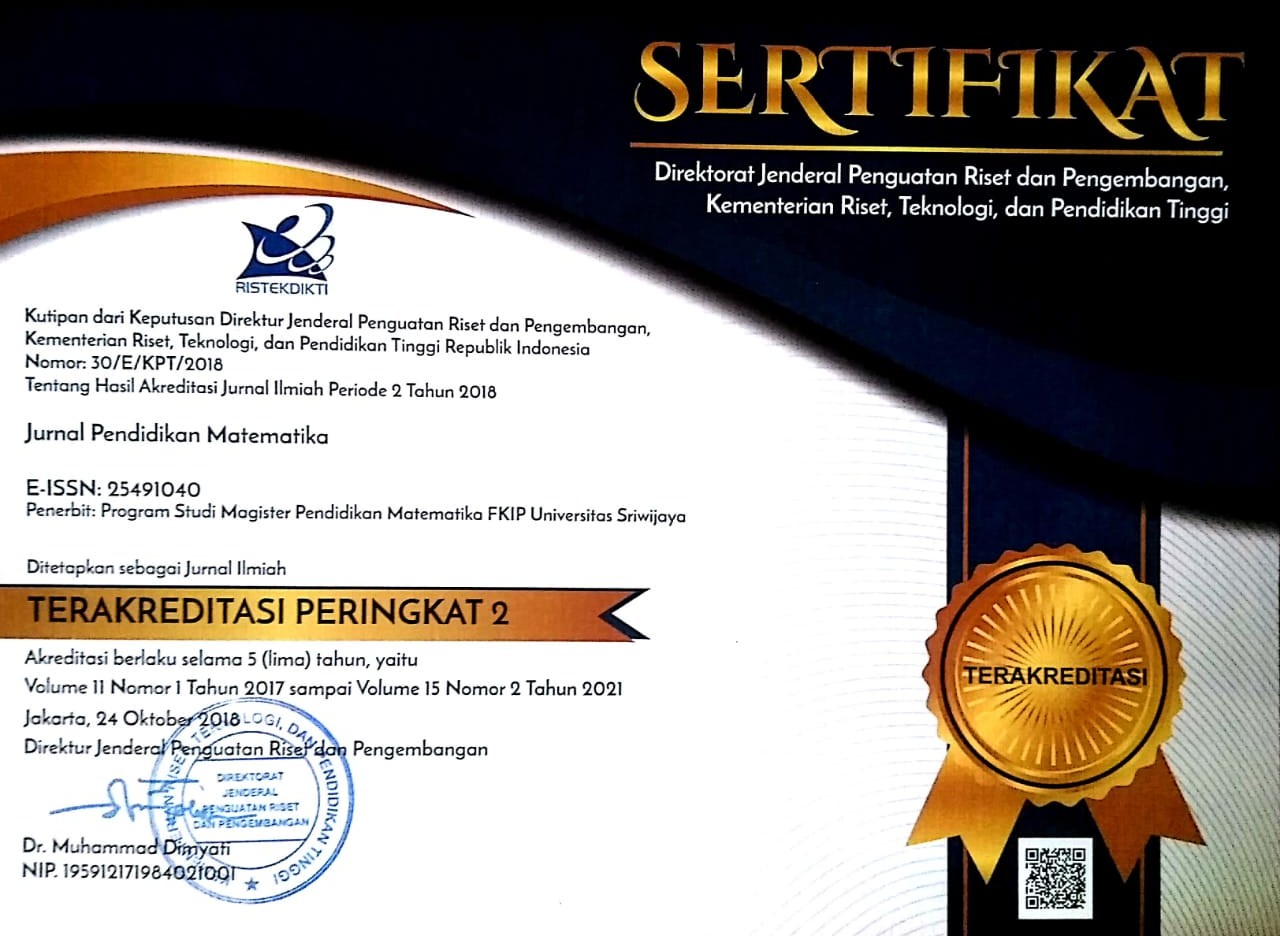Development of Meme Learning Media with PMRI to Implement Mathematics Literacy in Students Elementary School
Abstract
Low mathematical literacy is one of the causes of the lack of interest and motivation in learners. Mathematical literacy and realistic mathematical approaches have relevant characteristics. This research aims to develop memes as learning media with a realistic mathematical approach to develop mathematical literacy in elementary school students. The research consists of several steps, which are: analysis, design, development, implementation, and evaluation. The methods used are descriptive, evaluative, and experimental with a pre-experimental design. The instruments used were expert validation questionnaires, student response questionnaires, teacher observation sheets, and evaluation assessments. The results obtained from material experts were 79% and 78% from media expert, both in the appropriate category. Assessments of mathematical content obtained the validation results from the material experts and media experts with scores of 79% and 78%; both belong to the decent category. In large-scale trials, the results of the student response questionnaire after learning obtained a score of 73% while the evaluation results obtained a score of 60%. The students' evaluation scores are evenly distributed from the lower limit of 25 to the upper limit of 95. Based on the results, it can be concluded that meme teaching media with a realistic mathematical approach develop students’ mathematical literacy even though it is not a high level.
Keywords
Full Text:
PDFReferences
Abrar, A. I. P. (2018). Learn Dienes [in Bahasa]. Al-Khwarizmi: Jurnal Pendidikan Matematika dan Ilmu Pengetahuan Alam, 1(1). https://doi.org/10.24256/jpmipa.v1i1.52
Allifiansyah, S. (2017). Youth, Memes and Digital Democracy in Indonesia [in Bahasa]. Jurnal Ilmu Komunikasi, 13(2), 151. https://doi.org/10.24002/jik.v13i2.676
Astuti, P. (2018). Mathematical Literacy Ability and Higher Order Thinking Ability [in Bahasa].
Proceeding of the PRISMA: Prosiding Seminar Nasional Matematika, 1, 263–268.
Benoit, G. (2018). Mathematics in Popular Culture: An Analysis of Mathematical Internet Memes.
Retrieved from https://academiccommons.columbia.edu/doi/10.7916/D8BG45GT
Dewi, S. L. (2021). The Influence of Teaching Methods on Learning Interest of Elementary School Students in Mathematics Lessons [in Bahasa]. Jurnal Pembelajaran Matematika Inovatif, 4(4), 755–764.
Firdayati, L. (2020). Increasing Students' Learning Motivation Through Discovery Learning With Geogebra on Transformation Materials [in Bahasa]. AKSIOMA: Jurnal Program Studi Pendidikan Matematika, 9(3), 833. https://doi.org/10.24127/AJPM.V9I3.2899
Gunanto, S. G. (2021). Game-Based Learning: Constructive Media for Independent Learning for Students [in Bahasa]. Rekam, 17(1), 71–76. https://doi.org/10.24821/REKAM.V17I1.4951
Indah, N., Mania, S., & Nursalam, N. (2016). Improving Students' Mathematical Literacy Skills Through the Application of Problem Based Learning Models in Class VII SMP Negeri 5 Pallangga, Gowa Regency [in Bahasa]. MaPan, 4(2), 200 - 210. https://doi.org/10.24252/mapan.2016v4n2a4
Iswara, P. D., Julia, J., Supriyadi, T., Rahman, A. A., Hartati, T., Rahman, Sopandi, W., & Damaianti,
V. S. (2020). Initial reading lesson through “He is handsome” association method and android photo editor media [in Bahasa]. Universal Journal of Educational Research, 8(5), 2090–2099. https://doi.org/10.13189/UJER.2020.080547
Khasanah, A. N., & Mansoor, A. (2020). Chuck norris internet meme viral phenomenon study [in Bahasa]. DESKOMVIS: Jurnal Ilmiah Desain Komunikasi Visual, Seni Rupa Dan Media, 1(1), 89–101. https://doi.org/10.38010/dkv.v1i1.12
Lubis, W. A., Ariswoyo, S., & Syahputra, E. (2020). Ability to solve mathematical problems through a realistic mathematics education approach and an autograph assisted guided discovery approach [in Bahasa]. Edumatika: Jurnal Riset Pendidikan Matematika, 3(1), 1. https://doi.org/10.32939/ejrpm.v3i1.483
Margana, D. P., Iswara, P. D., & Gusrayani, D. (2017). Application of dictogloss and mindmap techniques in improving listening skills for class IV-B SDN Padasuka I students on announcement materials [in Bahasa]. Jurnal Pena Ilmiah, 2(1), 51–60.
Maryati, I., & Priatna, N. (2018). Integration of mathematical character values through contextual learning [in Bahasa]. Mosharafa: Jurnal Pendidikan Matematika, 6(3). https://doi.org/10.31980/mosharafa.v6i3.322
Matondang, A. R. (2020). Development of mandailing culture-based mathematics module with realistic mathematics approach (PMR) to improve mathematical communication ability [in Bahasa]. AXIOM : Jurnal Pendidikan dan Matematika, 9(1), 26.
https://doi.org/10.30821/axiom.v9i1.7230
Nugroho, A. A., & Purwati, H. (2015). Development of mobile learning-based mathematics learning media with scientific approach [in Bahasa]. Euclid, 2(1). https://doi.org/10.33603/e.v2i1.355
Nuraisah, E., Irawati, R., & Hanifah, N. (2016). Differences in the Effects of Using Conventional Learning and Contextual Approaches on Mathematical Critical Thinking Ability and Student Learning Motivation on Fractions Materi [in Bahasa]. Jurnal Pena Ilmiah, 1(1), 291–300.
Ramdani, E. (2018). Contextual learning model based on local wisdom as strengthening character education [in Bahasa]. JUPIIS: Jurnal Pendidikan Ilmu-Ilmu Sosial, 10(1), 1. https://doi.org/10.24114/JUPIIS.V10I1.8264
Sembiring, R. K., Hadi, S., & Dolk, M. (2008). Reforming mathematics learning in Indonesian classrooms through RME. ZDM - International Journal on Mathematics Education, 40(6), 927– 939. https://doi.org/10.1007/s11858-008-0125-9
Serevina, V., Khairunisa, S. G, & Widyastuti, E. (2019). Using the ADDIE model to develop learning material for actuarial mathematics. Iopscience.Iop.Org, 12052. https://doi.org/10.1088/1742- 6596/1188/1/012052
Setiawan, Y. (2020). Development of elementary school mathematics learning models based on indonesian traditional games and realistic mathematics approaches [in Bahasa]. Scholaria: Jurnal Pendidikan dan Kebudayaan, 10(1), 12–21. https://doi.org/10.24246/j.js.2020.v10.i1.p12-21
Silfitrah, S., & Mailili, W. H. (2020). The influence of learning interest and learning motivation on mathematics learning outcomes of class VII students of SMP Negeri 4 Sigi [in Bahasa]. Guru Tua : Jurnal Pendidikan dan Pembelajaran, 3(1), 53–60. https://doi.org/10.31970/gurutua.v3i1.39
Simarmata, Y., Wedyawati, N., & Rejeki Hutagaol, A. S. (2020). Analysis of mathematical literacy in solving story problems for grade V elementary school students [in Bahasa]. J-PiMat : Jurnal Pendidikan Matematika, 2(1), 100–105. https://doi.org/10.31932/j-pimat.v2i1.654
Ulya, I. F., Irawati, R., & Maulana, M. (2016). Increasing the Ability of Mathematical Connections and Students' Learning Motivation Using a Contextual Approach. Scientific Pen Journal [in Bahasa], 1(1), 121–130. https://doi.org/10.23819/PI.V1I1.2940
Wulandari, E., & Azka, R. (2018). Welcoming PISA 2018: Mathematical literacy development to support 21st century skills [in Bahasa]. De Fermat : Jurnal Pendidikan Matematika, 1(1), 31–38. https://doi.org/10.36277/defermat.v1i1.14
DOI: https://doi.org/10.22342/jpm.16.3.15249.339-350
Jl. Srijaya Negara, Bukit Besar
Palembang - 30139 Indonesia
Jurnal Pendidikan Matematika is licensed under a Creative Commons Attribution-NonCommercial-ShareAlike 4.0 International License.
Indexed in:


